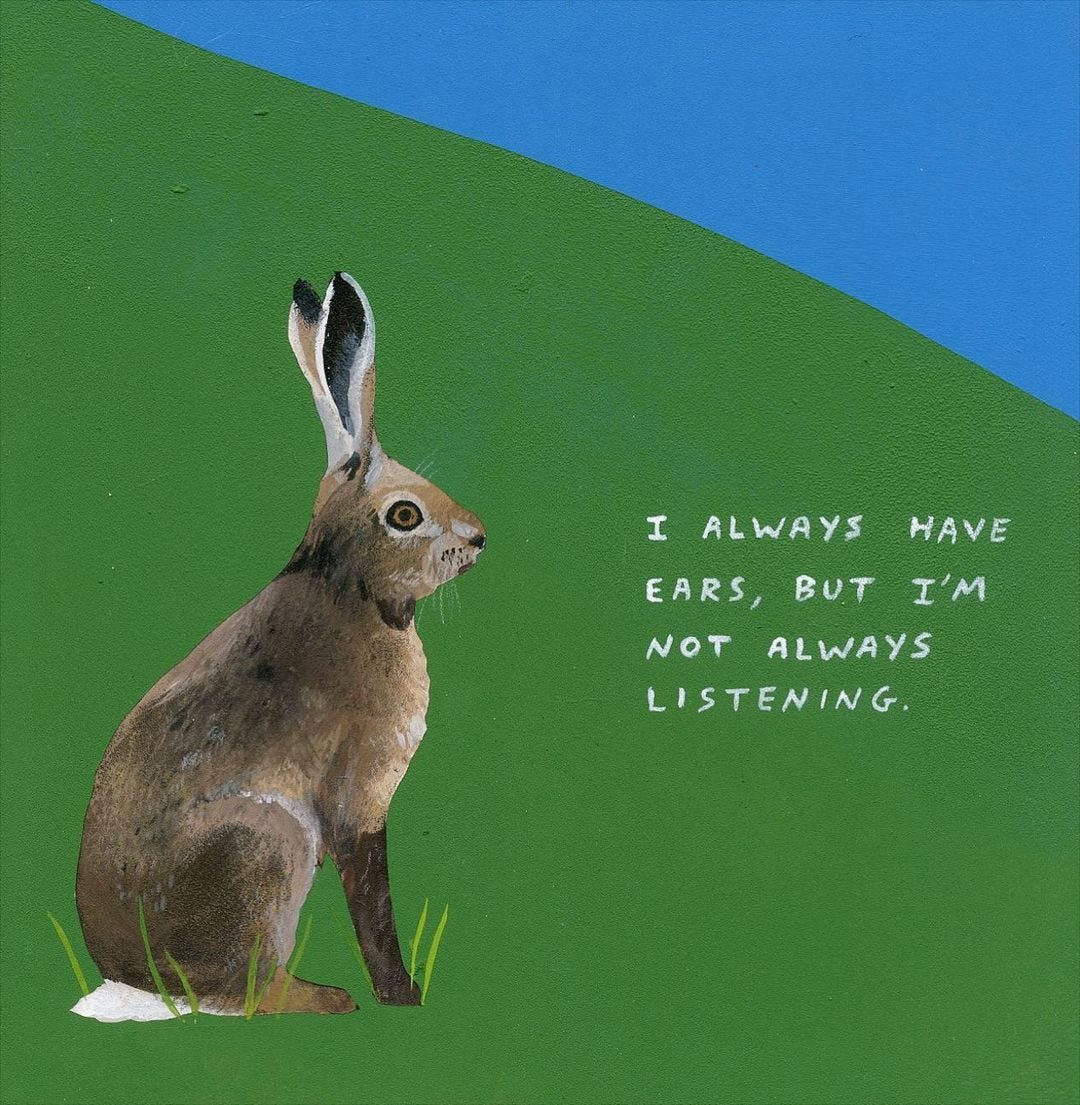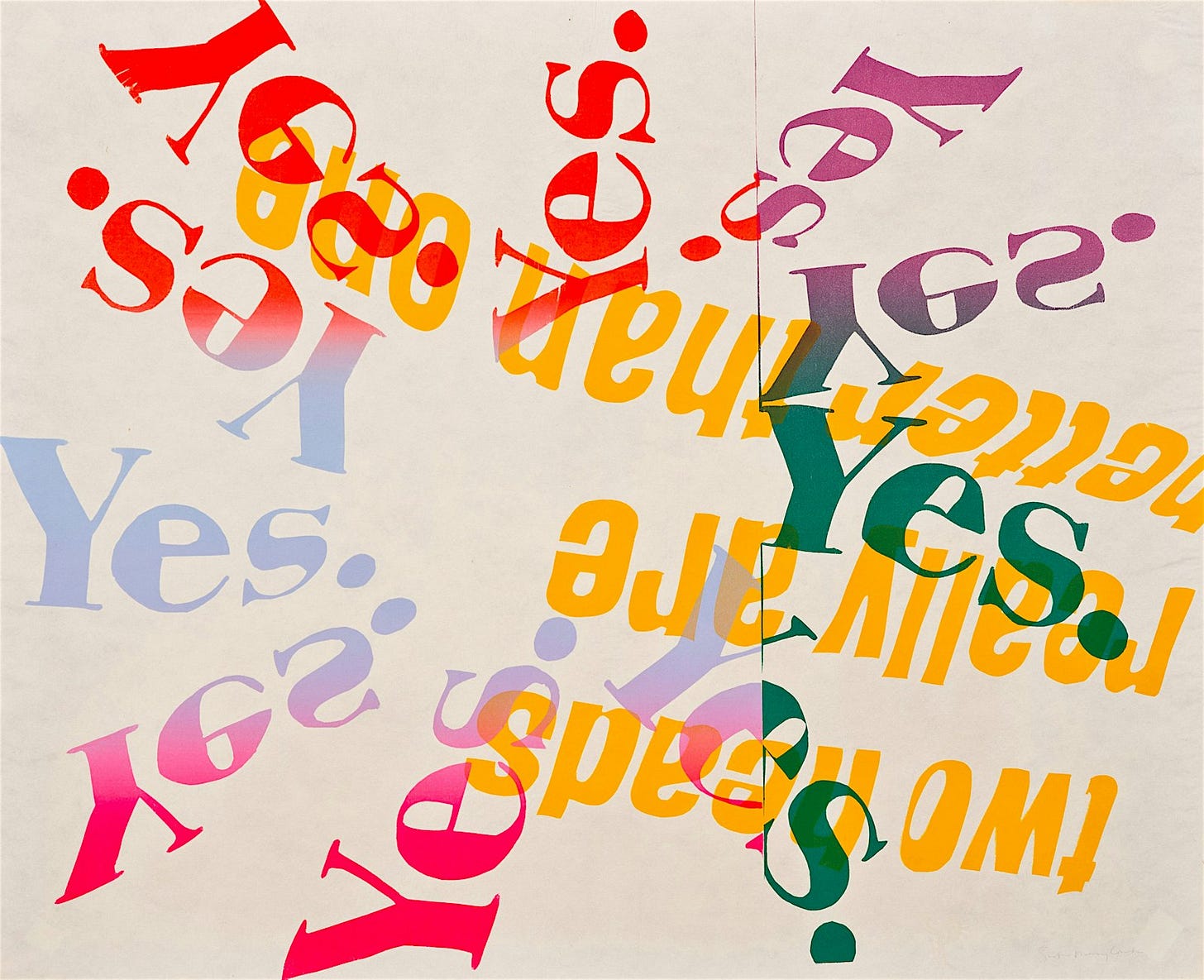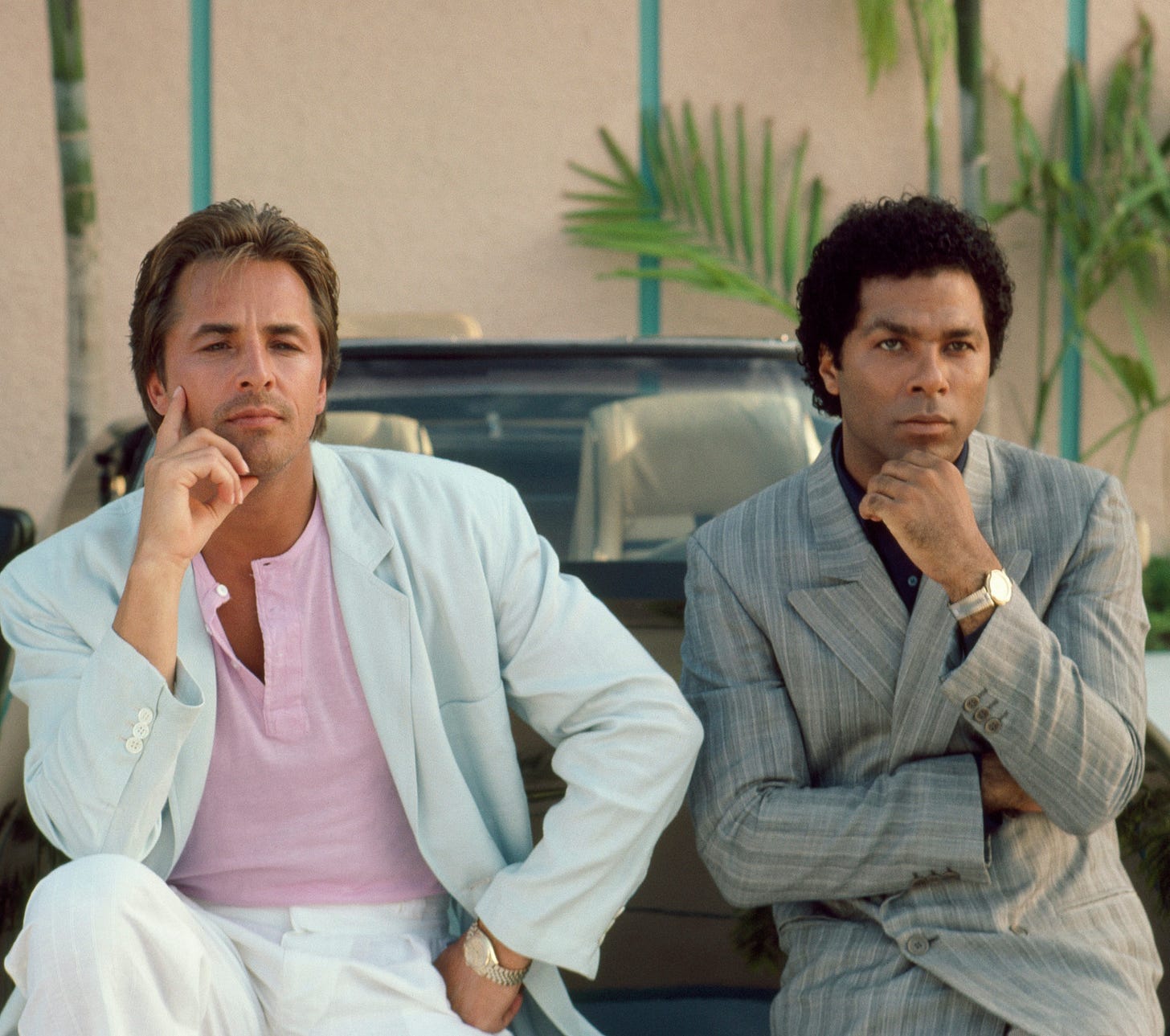Big yes
5 invitations to trust
“Find a place you trust and try trusting it for a while.”
That’s the first rule in Corita Kent’s Immaculate Heart College Art Department Rules, and it feels like a good place to begin this month’s invitations to trust.
If you’re new, welcome! Each month at The Ecstatic Review centers around a theme that we explore from lots of different angles, beginning with invitations for you to play with, think about, and try out.
We’re currently following the ideas within the letters of ECSTATIC, in purposely reverse order: starting with C for celebration, where we invited every part of you to the party of you, then I for integration, where we gathered everything together in kaleidoscopic ways. And now we’ve arrived at trust, where we’ll explore the intuitive logic of it all.
Any act of sharing your voice is an act of trust. And when you’re sharing your voice in new ways—through words you’re still finding, ideas you’re still shaping, work you’re still developing—you’re often being asked to trust yourself without any kind of map, while asking other people to trust you before you have proof.
As we explore trust, you’re not going to hear me saying things like “just trust yourself,” because that’s one of those phrases (see also: “just be yourself”) that’s ridiculously simple for something so complex. But I am going to suggest that you do have a map, and you do have proof. Because as someone who’s dedicated my career to articulating and amplifying big ideas and bold moves, I’ve yet to meet one that didn’t have logic built right in.
So, if you’ve ever felt called to create or do something that might just be totally bananas; if you’ve ever asked people to get on board while you’re still working out what exactly the board is; if you’re wondering how to find a place you can trust when you’re continually in motion, how to hear your own voice in a sea of strong opinions and good advice, or how to know if it’s the right path when you’re the one making it: this one’s for you.
Here are five invitations to trust:
Six years ago, my life changed all at once. I’d be lying if I said I was surprised, because the truth is I felt it coming and opened the door to let it in.
It was the kind of change that’s like one of those Chagall paintings where people are flying upside down in a sideways world, and for some reason there’s a goat in the picture who thinks this is all fine.
It was also the kind of change where a lot of people are happy to offer good advice about what to do next, and it’s very easy—because you’re upside down, the world is sideways, and why is there a goat?—to ask for it.
Whenever I meet a person or place who is going through significant change, I can always tell if they’re looking for answers from everyone but themselves. I can tell because I’ve been there. Maybe you have, too. Maybe you’re there right now.
If so, I invite you to try taking a break from taking advice.

I’m not against advice; the sentence just above this one could qualify as giving it. But I’ve found that whenever I can’t hear the sound of my own voice, the quickest way to change that is to turn the other sounds off. Just for a little bit. Just until I can hear my voice in the chorus again.
If it doesn’t work right away, I’ll offer some encouragement by telling myself that I might not hear my voice yet, but I trust that I will. Our voices rapidly bloom in the presence of encouragement and trust, especially when it comes from us. Even the tiniest amount goes far in knowing which good advice to take.
And more often than not, when our voices get just a little bit louder, we find that we were already telling ourselves exactly what we needed to hear.
I try to include one thing in every Ecstatic Review that makes me secretly snort with laughter. The kind of thing that if I was in school and someone scribbled it on a note and passed it to me during a test, I wouldn’t be able to contain myself. And I also wouldn’t be able to explain why, because that’s the point.
It’s an inside joke. An inside joke with myself.
That one little joke has a big job. It keeps me trusting that my voice is in the room, like a signature I’ve hidden in the corner of a painting so I know it’s mine.
The Proust joke in the Barbie movie is a good example of this. It’s a quick line spoken by the CEO of Mattel, played by Will Ferrell.
“Remember Proust Barbie?” he asks. “That did not sell well.”
The internet was confused. Someone on Reddit wrote:
An absolutely wretched joke. It seems to serve no purpose other than to indicate the filmmakers are familiar with Proust.
I’m guessing its purpose was that it made Greta Gerwig snort with laughter, which kept her trusting that her voice was in the room while she made a movie that feels as personal as it does commercial.
What’s your version of an inside joke? It might not be a joke at all, but an unexpected shade in a color palette, a delightfully dissonant chord in a musical composition, or a whimsical accessory in an otherwise classic ensemble.
Other people might not get it, but that’s not the point. The point is your voice is in the room. And you’re trusting it.
This invitation was first shared with me by Liz Engleman, who inspired last month’s “Just Float,” when I was developing a project with lots of different things in it and struggling to decide which ones to include.
It comes from the 1980s TV show Miami Vice, which was really innovative at the time because, unlike standard police procedurals, it drew heavily upon New Wave culture and integrated it into its music, visuals, and whole vibe.
The story goes that there was a person on the show whose job was to look at all of the elements—casting, script, design, props, location—and decide which ones felt true to Miami Vice and which ones didn’t. To do that, they’d walk around the set, point to things, and simply say, “Vice. Not Vice. Vice. Not Vice.”
Don Johnson in pastels? Vice. A well-placed palm tree? Vice. A polka song in a synth-heavy soundtrack? Not Vice.
I’ve found this approach to be especially helpful when developing a project or brand with multiple elements, or developing your own elemental voice again after years of operating within someone else’s playbook. Sometimes we can’t say why something is true to our voice, belongs in what we’re working on, or just feels right, but we can point to it.
What’s yours? What’s not yours? Don’t worry about explaining it yet. Just try pointing to it first, and trust that the reasons will come.
I tucked this invitation into last year’s Small Talk Survival Guide, and it’s such a great shortcut to trust that I’m here to give it the attention it deserves.
It’s simple: Whenever you’re about to speak—through words on a page, to a roomful of people, into the camera on your phone, or in an interview or a pitch—try thinking “I’ve got you” right before you begin.
Who do you got, exactly? Whoever is in the conversation with you.
When we’re sharing our voices, it’s easy to feel like we’re all alone up there. Like the pressure is all on us to deliver everything. But I’ve said it before and I’ll say it forever: Voice is a conversation. And when you feel called to share your voice, it’s usually because you sense that there’s something that someone needs to hear.
Even if it’s a job interview where they’ve got all the power? Yes, even then. It might not always feel this way, but people are usually hiring because they need help. Which means they need to hear “I’ve got you” as much as anyone else.
“I’ve got you” is a simple reminder that we’re all in this together. That even if you’re the one doing all the talking, you’re not doing it alone. There’s someone else in the room with you, or just on the other side of the screen, who’s glad to know that they’re not alone, either.
When others can feel that you’ve got them, this pretty magical thing happens:
It’s suddenly much easier to feel that you’ve got you, too.
Something about me is that whatever I do, I’m probably going to do it full out.
That kinda sounds like a brag, but trust me it’s not. Playing full out in situations that aren’t built for it, or with people who aren’t into it, not only defies the basic laws of physics; it’s a hop, skip, and a jump to exhaustion and self-doubt.
“Why do I always have to go so big?” I used to ask myself again and again.
“Because it’s how you work and it’s who you are,” myself would say back.
Enter: the big yes.
Elaine on Seinfeld loved a big salad; I live for a big yes.

Before I say yes to working on something, I always check to see if it’s a big yes. Before I say yes to working with someone, I check to see if it’s a big yes for both of us. We’re not looking for an OK fine or even a yeah sure; we’re going for no less than a full-body, let’s-do-this, I’m-all-the-way-in yes. Experience and the laws of physics have taught me that’s the only way this is going to work.
It took me years to trust the big yes—I’m still trusting it!—but I’ve found that it’s a muscle you can strengthen pretty quickly.
Start small: What song is a big yes for you? What color? What lunch order?
Not everything in life needs to be a big yes, but when it comes to things that you’re throwing your heart and soul into? A big yes helps. Pretty soon, deciding on your next career move, client project, or collaboration won’t feel so daunting. You’ll be able to tell if it’s a yeah sure or a big yes, and trust the answer that comes.
I hope these invitations have inspired at least one big yes for you. Your voice in this conversation is always a big yes for me.
I’ve got you,
Three things:
A portion of this month’s paid subscriptions will support Corita Art Center, a nonprofit organization based here in LA that’s dedicated to keeping Corita’s message of love, hope, and justice alive through scholarly research and direct community service. Every time I’ve gotten to meet the CAC team, it’s so clear that their work is one big yes for them.
If you’ve been considering the whole Ecstatic Review experience, yearly paid subscriptions are 20% off through August. $40/year or $5/month gets you exercises, practical applications, and extra perks.
If you enjoyed these invitations, I’d love it if you’d share a thought, question, or idea in the comments! I think of the Review as one big conversation with you, and I truly love hearing what you have to say.
P.S. Want more invitations? Here you go:
















Not me pointing to everything in our office this morning and saying: "Alicia. Not Alicia." 🤣🤣🤣 Love all of these so much, Cate!
I go through periods of ignoring outside perspectives so I can listen to my inner voice. I needed to read this today.